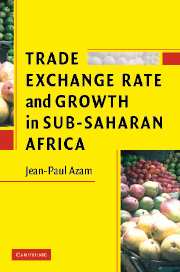Book contents
- Frontmatter
- Contents
- List of figures and tables
- Preface
- List of acronyms and abbreviations
- 1 Introduction and overview
- Part I Unrecorded trade in goods and currencies
- 2 The welfare implications of unrecorded cross-border trade
- 3 Parallel trade and currency convertibility
- Part II Foreign exchange constraints
- Part III Longer-term growth in African countries
- General conclusion
- References
- Index
2 - The welfare implications of unrecorded cross-border trade
Published online by Cambridge University Press: 26 May 2010
- Frontmatter
- Contents
- List of figures and tables
- Preface
- List of acronyms and abbreviations
- 1 Introduction and overview
- Part I Unrecorded trade in goods and currencies
- 2 The welfare implications of unrecorded cross-border trade
- 3 Parallel trade and currency convertibility
- Part II Foreign exchange constraints
- Part III Longer-term growth in African countries
- General conclusion
- References
- Index
Summary
Introduction
Most developing countries do not have the administrative capacity for raising tax revenues in an efficient way. Foreign trade turns out to be one of the easiest taxes to exploit, since traded goods have to pass through easily monitored points, such as seaports, train stations, or airports. Customs officers thus play a major role in collecting fiscal revenues for the government, and sometimes for themselves, as “informal levies.” This is especially true in Africa, where taxes on foreign trade often amount to about half the total tax revenues. Table 2.1 illustrates this point by showing the ratio of trade-related taxes to total tax revenues in selected Sub-Saharan countries in the 1980s.
Many attempts have been made to change this situation, but the need to collect fiscal revenues is delaying reform. For example, between 1997 and 2000 the West African Economic and Monetary Union (WAEMU) adopted various reforms aimed at harmonizing the taxation of trade flows among its members, and at creating a common external tariff (CET), while removing tariffs on most intra-WAEMU trade. However, various escape clauses were put in place allowing countries to introduce temporary new taxes, which have in many cases become permanent.
All these levies bear generally more heavily on imports and on export crops, and create significant distortion. They provide some protection to firms that produce import substitutes and thus create, in many cases, an anti-export bias. Moreover, the figures in table 2.1 are an under-estimate for some countries.
- Type
- Chapter
- Information
- Trade, Exchange Rate, and Growth in Sub-Saharan Africa , pp. 11 - 44Publisher: Cambridge University PressPrint publication year: 2006
- 1
- Cited by



